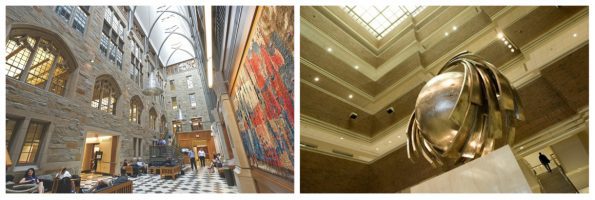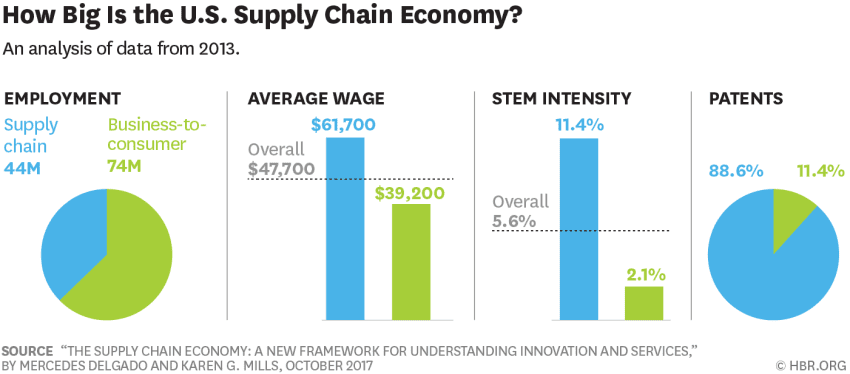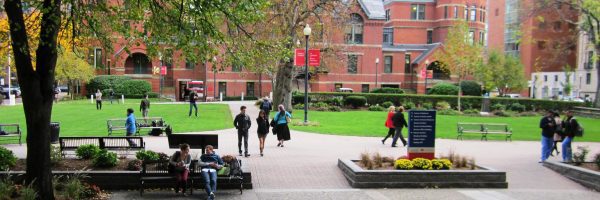MIT Sloan Debunks Entrepreneur Myths, and More – Boston News

Let’s explore some of the most interesting stories that have emerged from Boston business schools this week.
The 20-Year-Old Entrepreneur is a Lie – MIT Sloan Newsroom
MIT Sloan School of Business professor Pierre Azoulay and Ph.D. student Daniel Kim used a new working paper as an opportunity to debunk the myth of the 20-year-old Silicon Valley tech-prodigy entrepreneur. The reality is that the average age of successful entrepreneurs veers closer to 42. Azoulay elaborates:
“If you knew nothing else, and you had two identical ideas, one proposed by a very young person, one proposed by a middle-aged person, and that’s the only thing you have to go on, you would be better off—if you wanted to predict success—betting on a middle-aged person.”
Kim adds: “In theory, we know that with age a lot of benefits accumulate. For instance, you get a lot of human capital from experience, you also get more financial resources as you age, as well as social connections, all of which will likely boost your odds of success as an entrepreneur.”
Read more about the duo’s research here.
Case Study: Can This Japanese Snack Food Company Break into the U.S. Market? – Harvard Business Review
As part of a fictionalized case study, HBR recently published a profile on Kenko USA, the American subsidiary of Japan’s largest rice cracker producer, about its ongoing plans to enter the American market. Kenko USA hopes to become synonymous with rice crackers much in the same way that Kikkoman became inextricably linked with soy sauce.
In 2012, Riku Nakamura relocated from Tokyo to San Mateo, California to oversee the launch of Kenko’s first foreign subsidiary. According to the article, “Riku knew that the key was to expand beyond Asian supermarkets and grocery stores’ “international” sections and get Kenko crackers into the snack aisles of mainstream U.S. food outlets, but his team’s efforts had yet to bear fruit.”
You can read the entire case study here.
Hybrid Strategy Leaves Auto Industry Leaders Playing Catch-up, Professor Says – D’Amore McKim News & Research
There’s quite a bit of chatter within the auto industry about the so-called “hybrid trap” in which established industry leaders have been forced to catch up to the hybrid strategies of more aggressive startups to varying degrees of success.
Northeastern University D’Amore-McKim School of Business‘ Jean C. Tempel professor of entrepreneurship and innovation Fernando Suarez explored this phenomenon in detail as part of an MIT Sloan Management Review article. He elaborates:
“Most established corporations follow the hybrid approach because it gives them peace of mind. It allows incumbents to convince themselves that they’re responding to technology-driven transformation in their industry when, in fact, they’re losing ground. They fall back on learned patterns, which slows development. When you are serious about going the route of new technology, you have to rethink all of your designs and processes.”
Read more about Suarez’s research here.
MBA Battle: BU Questrom v. BC Carroll

Boston College and Boston University are two of the metro’s most popular and recognizable schools. But for two schools with a lot in common, BU and BC don’t seem to like each other much. Continue reading…
What They’re Saying: Spring Break is Sadly Almost Over

While the East Coast of the U.S. is catching up with another pleasant April storm cyclone, the rest of the business school community is back at work, shedding off the sunburned skin of a spring break well had. With the end of the formal academic year drawing near, students are preparing for the home stretch.
Check out some of the things business schools around the U.S., Canada, and UK are saying about the end of spring break and what you need to know before the academic year closes out.
Spring Break is almost over. It’s time to start thinking about Summer! Register tpdayfor @BaruchCollege #summersession courses & finish your degree early! #BaruchSummer18 #BeBaruch #academicexcellence pic.twitter.com/UJWNEyy7kU
— Baruch College (@BaruchCollege) April 4, 2018
Snowy spring break! #LeBow MBA & MS students are in Romania meeting industry leaders, including @fitbit. Check our Instagram story for live updates. pic.twitter.com/anS73QiRQl
— LeBow College (@LeBow) March 26, 2018
It’s OFFICIALLY spring break! Our MBAs will be in China, Colombia, and Brazil getting a hands on #GlobalBusiness experience 🗺💼✈ pic.twitter.com/BDaPceTOCa
— Johnson at Cornell (@CornellMBA) March 31, 2018
From climbing volcanoes to discovering secrets of luxury marketing, spring break for some Questrom students was about enhancing their business acumen through cultural immersion. https://t.co/lA6oQsdOCB
— BU Questrom (@BUQuestrom) March 29, 2018
It’s extra quiet at the #RadySchool during Spring Break! We miss our students, but hope you are enjoying your break! pic.twitter.com/Kk2LaYMLk2
— Rady School (@RadySchool) March 28, 2018
MIT Explores Happiness, and More – Boston News

Let’s explore some of the most interesting stories that have emerged from Boston business schools this week.
Probing the Origins of Happiness – MIT Newsroom
On the #InternationalDayofHappiness, Kara Baskin at the MIT Sloan School of Management explored the new book “The Origins of Happiness: The Science of Well-Being over the Life Course,” which was co-authored by MIT Sloan Ph.D. student George Ward. Talking about his work, Ward explains how global governments have been attempting to tap into the data of happiness in hopes of shaping future policies.
“We wanted to bring together this body of work in a systematic, quantitative way,” he explains. “Often, these are single studies that say ‘x’ is important for happiness; ‘y’ is important for happiness. In this book we try to provide an overarching framework that documents what makes for a satisfying life.”
“On the policy side,” he continues, “more and more countries are using well-being data in the real world. As we speak to policymakers, they often ask the question: ‘Look, we’re measuring this now and we have the impetus to improve these figures, move up these tables of happiness, and make our citizens enjoy their lives more. What can we do?'”
You can read the rest of the Ward interview here, and grab a copy of “The Origins of Happiness: The Science of Well-Being over the Life Course” today.
The Supply Chain Economy and the Future of Good Jobs in America – Harvard Business Review
The Harvard Business Review recently published an article from Mercedes Delgado and Karen Mills that outlines the increased role service suppliers will play in what some have dubbed the “supply chain economy.” Supply chain industries are simply “businesses that manufacture parts to be used in a final good,” like plastic injection molders and metal stampers.

These industries “have a crucial role in driving innovation and creating well-paying jobs,” in part because they “have downstream linkages to multiple industries, which allows the innovations they create to cascade and diffuse across the economy, potentially increasing the value of those innovations.”
Read more about HBS’ policy suggestions to emphasize “suppliers’ access to skilled labor, buyers, and capital” here.
BU Grad Schools Among Nation’s Best – BU Today
Several schools in the Boston metro saw a nice rankings boost in the recently release U.S. News & World Report Best Business Schools 2019 list, with the Questrom School of Business at Boston University leaping up two spots overall from last year, up to 42nd overall. The school’s part-time program also finished 10 spots better than last year, coming in 32nd overall.
In a release, Kenneth Freeman, Allen Questrom Professor and Dean in Management, said, “Rankings are inherently imperfect, but we appreciate the acknowledgement of the quality and reputation of our students, program, and alumni. Each year, we adjust our curricular content in response to student needs and our increasingly engaged corporate partners to create experiential opportunities to bridge the classroom and industry.”
You can catch up on the rest of BU’s graduate schools in the new ranking here.
MIT Students Heading to the Vatican, and More – Boston News

Let’s explore some of the most interesting stories that have emerged from Boston business schools this week.
MIT Students Heading to Rome for First Ever Vatican Hackathon – MIT Newsroom
The first of its kind VHacks will take place in Vatican City from March 8-11, bringing in 120 students from various universities around the world to the city-state of the Roman Catholic Church.
“This is not just for the church,” said Sophie Liao, MIT Sloan MBA ’18, in an interview with Meredith Somers from the MIT Newsroom. “This is more about breaking boundaries. Everyone is a migrant, everyone should be involved in this discussion no matter what country they come from.”
“While this is the first event of its kind at Vatican City, using technology to address more than just science isn’t a new thing for the sovereign state’s most famous resident. In a TED Talk last year, Pope Francis suggested how ‘wonderful it would be if the growth of scientific and technological innovation would come along with more equality and social inclusion.'”

Pope Francis made a surprise Ted Talk in 2017, discussing the importance of humility / Photo via Ryan Lash, TED
You can read more about the upcoming VHacks event in Vatican City here.
Sawyer Introduces New Master’s in Marketing – Sawyer Business School
The Sawyer Business School at Suffolk University has announced its new Master of Science in Marketing degree, which prepares students to “approach complex marketing problems, analyze information, and develop high-quality strategic and tactical solutions.”
“Most master’s-level programs in marketing give the qualitative tools pretty short shrift,” says Professor Elizabeth Wilson, chair of the Department of Marketing. “But knowing how to do that kind of research and understanding the whole spectrum of social science research methods is something every employer will value.”

Product management is one of the three concentrations offered in the new Master’s of Marketing program at Suffolk / Photo via nbbj
Three concentrations will be offered as part of the new Master’s program, including: product management, global marketing, and market research and customer insights.
“’I’m excited to see the new MS in Marketing program. The marketing landscape is constantly evolving, and the way brands need to talk to their customers is evolving as well,’ says Victor Davidson, MBA ’12, senior vice president of analytics at SavingStar. ‘The new degree program will empower students to stay on the forefront of these changes and position themselves as top marketers.’”
You can read more about the MSM here.
How News Coverage is Impacting ExxonMobil’s Social Responsibility – Simmons School of Management
Simmons School of Management professor Edward Vieira recently co-authored a study that analyzed ExxonMobil’s corporate social responsibility messages over a 12-year period, from 2002-03, to “determine if there was a relationship between news coverage and subsequent CSR efforts.”
“Corporations that don’t live up to stakeholder expectations may experience a decrease in credibility, reputation, and legitimacy. It’s beneficial for an organization to consistently communicate its CSR actions as well as address culturally relevant events. Therefore, it’s logical that as the world’s fourth largest oil producer, ExxonMobil’s CEO’s letters delivered CSR messages that focused on major external events.”
Read more about Professor Vieira’s research here.
2018 Trends: How Much Can You Get Out of a Boston MBA?

Boston, the largest city in New England, is often considered the academic, economic, and cultural center of the Northeastern United States. Beantown is also considered one of top college towns in the country thanks to its numerous esteem colleges and universities. Lots of that talent sticks too: Forbes ranks the city as one of the best places for business and careers. Continue reading…
